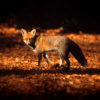In a previous post, I wrote about the Dog Days, or the hot, feverish period in summertime when the ancients believed that madness gripped the land. The Romans attempted to avert this malevolent influence by sacrificing a brown dog, an action that was also intended to appease a stern agricultural deity. It is truly astonishing to think that an ancient pagan ritual is in the process of being revived by the highest in the land, the only material differences being that they’re planning to kill brown foxes in their thousands and condemn these creatures to an even more barbaric death than that which was reserved for the brown dog upon a reeking altar in byegone Roman times.
While it might seem like something from a Hammer horror film, this scenario is nonetheless very real, so it will be fascinating to learn what the Church, the supposed guardian of Britain’s morality and spiritual well-being, makes of the spectre of a heathen blood ceremony being re-enacted in England’s otherwise “green and pleasant land”.
However, there’s far more to the curious matter of the Dog Days than just this gruesome atavistic resurgence. Britain has a long-standing and intimate connection with dogs, because many households in Britain own a creature that’s treated more as a loved member of the family than as a working animal or a mere pet. Just one example was Boatswain, a dog who belonged to one of Britain’s very greatest poets, Lord Byron, who himself roundly mocked the practise of fox-hunting in Canto XIV of his classic Don Juan. Little wonder then, that Lord Byron’s epitaph to his beloved dog began with these lines:
Near this Spot
Are deposited the Remains of one
Who possessed Beauty without Vanity,
Strength without Insolence,
Courage without Ferocity,
And all the virtues of Man without his Vices.
Nor was Lord Byron the only towering and admired English figure to be closely associated with dogs; Winston Churchill was thought to embody the British bulldog spirit, a quality that saw the British through the near-disaster of Dunkirk to the stunning victory by The Few over the Luftwaffe during the Battle of Britain. Curiously enough, Churchill suffered from bouts of depression, but he managed to alleviate and manage this otherwise crippling gloom by personifying it as an entity he referred to as his ‘black dog’. A dogged determination never to give in was at the heart of the manner in which Churchill fought off his melancholy, and it was also the quality that saw the British through Dunkirk and the Battle of Britain, while the word ‘dogged’ itself derives from the persistence and loyalty attributed to canines.
If that were not enough, the British have always prided themselves greatly on a sense of fair play, something that’s not immediately apparent when a fox is being pursued by a pack of dogs specifically bred for stamina. To make this alleged ‘sport’ even more one-sided, this pack is always reinforced and encouraged by a cohort on horseback, a cluster of off-road vehicles and a legion of foot followers, not to mention the terriermen who dig out the exhausted and terrified creature when it believes it has found blessed sanctuary beneath the earth. The whole ghastly process makes a mockery of the British taking a pride in siding with the underdog, or with the contestant who has the odds stacked against him, because those who support fox-hunting are going against one of the most ingrained, valuable and cherished characteristics that we as a nation possess.
By way of stark contrast with Byron’s poetry, Britain’s bulldog spirit, our disposition to side with the underdog and our beloved pets, there is a dark and spiritually bankrupt side to the British association with dogs. We glimpse this abyss in the pursuit of foxes by packs of hounds, as well as the deer and hares that some in Britain wish to see ripped apart alive once more for the amusement of onlookers. There is the setting of terriers onto foxes underground, which classifies as fox-baiting, while we also have the growing reality of people using some dogs as weapons against innocent passers-by, and the other ‘minority pastime’ of organised dog fighting. This grim litany of savagery is hard to comprehend, but it nonetheless exists and the movement to legalise these activities is gathering pace.
As ever, there is nothing new under the sun, and the distinction between the benign and malevolent aspects of our association with dogs was admirably summed up by William Shakespeare in his play Macbeth, where he used the different varieties of dogs as a metaphor for the characters and values of men.
First Murderer
We are men, my liege.
MACBETH
Ay, in the catalogue ye go for men;
As hounds and greyhounds, mongrels, spaniels, curs,
Shoughs, water-rugs and demi-wolves, are clept
All by the name of dogs…
Macbeth goes on to describe the ‘valued file’ that distinguishes between the different varieties of dog, asking the murderers:
“Now, if you have a station in the file
Not in the worst rank of manhood, say it…”
“The worst rank of manhood” – Macbeth was written over 400 years ago, but in all that time, I’ve yet to see or hear a better description of those who derive pleasure and enjoyment from the pursuit, torment and ripping apart of a wild animal.
Keep the Hunting Ban in place.
Let sleeping dogs lie.






